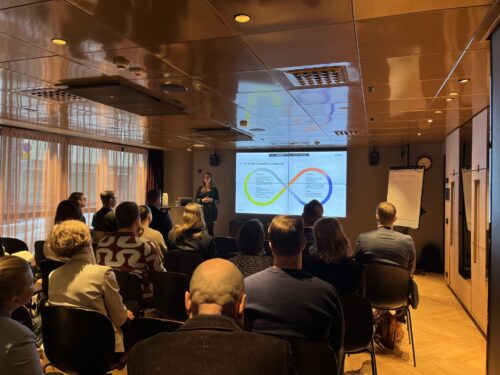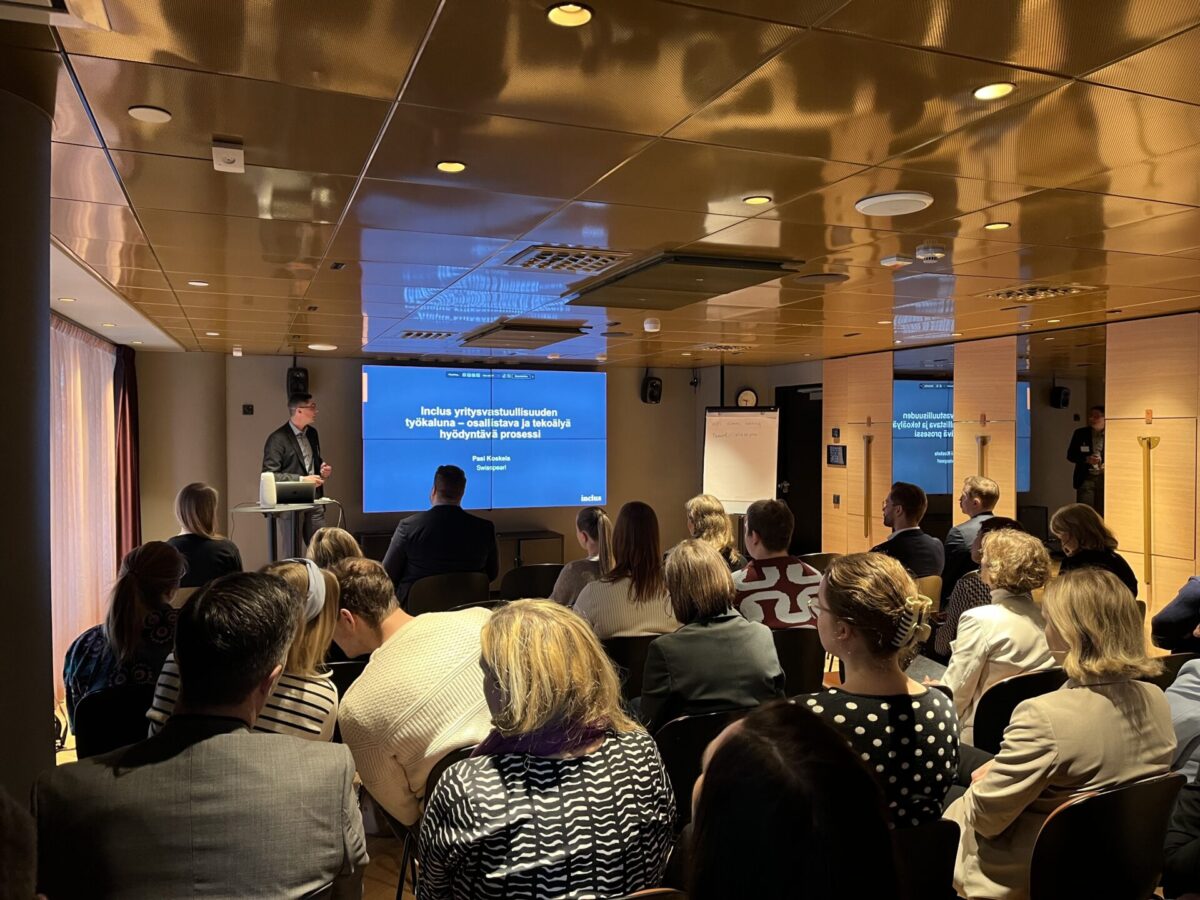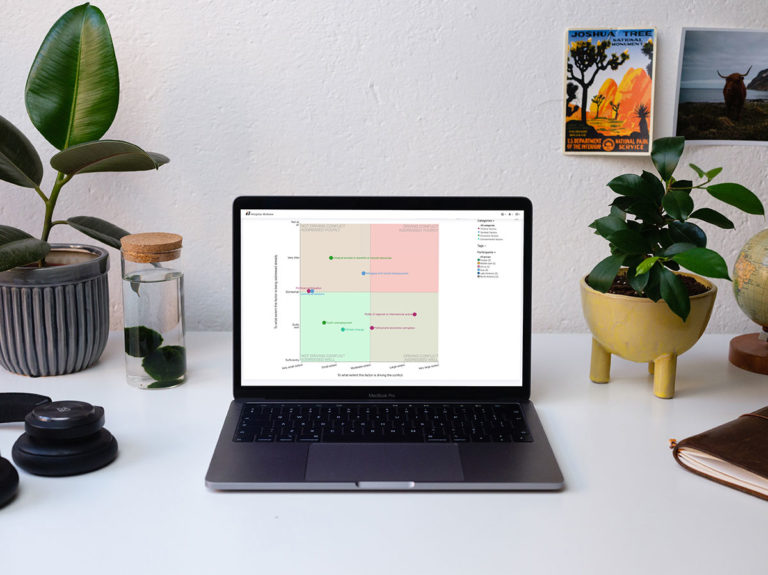A recap of Inclus’ Breakfast Seminar
The shared practices highlighted by guest speakers from Miltton and Swisspearl at Inclus’ breakfast seminar reinforce the notion: Sustainability is not only a reporting obligation but a strategic advantage. Miltton’s presenter highlighted the run-through of a typical double materiality assessment process, which the participants found helpful. Also well received was Swisspearl’s presentation that stressed, among other things, the value of AI tools in processing and analyzing large amounts of data.
The breakfast seminar by Inclus, held at the Scandic Hotel Marski in downtown Helsinki on February 15, 2024, highlighted the role of process-oriented data management and the opportunities it brings to ESG management.
The seminar highlighted various perspectives on the significance of integrating sustainability into business operations. Presentations were delivered by experts Hanna Ritari from Miltton, Pasi Koskela from Swisspearl, and Mikaeli Langinvainio from Inclus, each shedding light on various aspects of sustainability challenges and opportunities.
Double materiality and strategic integration at Miltton, step by step
Hanna Ritari, Director, Sustainability Reporting & Senior Sustainability Advisor at Miltton presented a typical example of a double materiality analysis project. Miltton’s team of ESG consultants have been leveraging Inclus to digitally facilitate the process with their customers.

In Miltton’s double materiality analysis projects, the process typically divides into four phases:
- Understanding the context: In this phase, a baseline understanding is formed about potentially relevant sustainability aspects related to the company’s business model, value chain and strategy.
- Identification of sustainability effects, risks and opportunities: This phase aims at identifying and determining more precise sustainability-related effects on people and the environment, as well as the corresponding financial risks and opportunities.
- Assessment of sustainability effects, risks and opportunities: Here, the sustainability impacts, risks and opportunities will be scored and evaluated by combining quantitative and qualitative criteria in the ex ante assessment and/or assessment workshop.
- Synthetizing results, validation and reporting: Finally, the fourth phase is about validating the process and final results, describing the double materiality assessment process in accordance with the requirements and in the board’s activity report in accordance with the ESRS requirements.
Miltton has been utilizing Inclus particularly in the early phases of the double materiality assessment process, to engage stakeholders in identifying sustainability factors, and again particularly in the assessment phase, where stakeholder insights are important in order for the final reporting to properly consider all relevant risks but also opportunities.
Through a comprehensive process, from data collection to scoring, assessment and documentation, Miltton highlighted the need for both positive and negative effects to be evaluated with granularity, emphasizing customization over generic solutions.
Swisspearl’s sustainable journey leveraging digital tools and AI support
Pasi Koskela, Head of Sustainability at Swisspearl shared his experiences from the Swiss company’s venturing into publishing its first Sustainability report in 2022.
Similarly to what was stressed in Miltton’s presentation, Swisspearl’s approach to the Corporate Sustainability Reporting Directive (CSRD) was not just as a compliance exercise either, but as a process to derive intrinsic benefits for the company.
”We were looking for a partner with whom we can develop our methodology and interpretation of data and not just fulfill the reporting obligation. In Inclus’ team and tool, we found the support and sounding board we needed to develop our approaches”, Pasi Koskela explains.
Swisspearl wanted to tie in sustainability reporting to their Enterprise Risk Management (ERM) process to foster strategic thinking and address potential competence gaps. By employing Inclus, they achieved an integration of sustainability data into their ERM framework, enhancing their risk assessment and strategic decision-making capabilities.
In the double materiality assessment process particularly, Inclus has provided support to Swisspearl’s stakeholder engagement, and the utilization of AI has proved really helpful in processing and summarizing their views.
“When there’s really a lot of data to digest, AI is the way to support the process, unless you want to spend weeks on combing through Excel files”, as Pasi Koskela puts it.
Finally, analyzing and visualizing the results of the assessment has been done with Inclus, and Swisspearl have also found it helpful in producing the necessary methodology documentations for the purpose of auditors’ review.
Swisspearl’s commitment to sustainability was further evidenced by their fully digital approach to running the assessment and reporting process, involving 23 individuals from 7 countries without incurring CO2 emissions from travel.
When asked about the participants’ response rates, Pasi Koskela mentioned that they have been consistently high, while some of the factors related to financial impacts have been understandably rather difficult for some of the stakeholders to assess.

ESG efforts as a growth amplifier
Mikaeli Langinvainio, CEO and Co-founder of Inclus, in his brief presentation highlighted the intersection of analytical complexity in peace processes and ESG issues due to the multifaceted and interconnected challenges each presents.
Both sustainability and risk management require an understanding of various stakeholders’ perspectives and the potential long-term impacts of actions taken today.
Langinvainio also referenced an article by McKinsey, highlighting the article’s analytical finding that, among more than 2,000 researched companies, ESG efforts essentially serve as a growth and profitability amplifier for those companies that put their best efforts into sustainability.
Inclus demo: A digital tool to support double materiality analysis
Towards the end of the seminar, Valtteri Frantsi from Inclus briefly showcased through a hands-on demonstration the tool’s capabilities to support double materiality analysis.
Inclus’ process planning support aids in identifying relevant topics and their complexities, and its dynamic visualization features help in understanding the diverse perspectives on threats, opportunities, and the assessment of risk versus probability.
The primary – and frequently the most lasting – benefit of stakeholder collaboration in ESG processes is the impactful discussions that take place, and have the potential of altering the strategic course and performance of the company.
Learn more about Inclus’ approach to Double Materiality Assessments in our earlier blog, available here.



